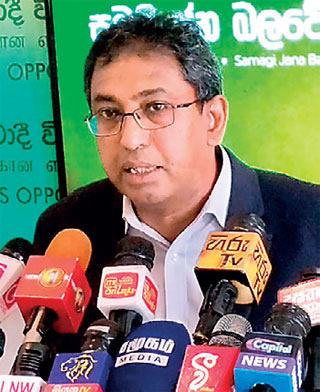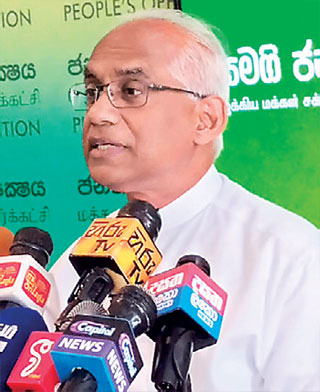Sunday Feb 15, 2026
Sunday Feb 15, 2026
Thursday, 2 February 2023 02:08 - - {{hitsCtrl.values.hits}}
By Darshana Abayasingha
 |
| SJB MP Dr. Harsha De Silva |
 |
| SJB MP Eran Wickramaratne
|
The main Opposition, Samagi Jana Balavegaya (SJB), yesterday clarified comments made by its leader, Sajith Premadasa, with respect to the IMF program, and said the party is committed to its implementation, but will negotiate some changes to the framework.
Premadasa’s comments on Monday caused a stir within political and professional circles, when just last week his party’s Economic Council had challenged left wing parties to showcase any workable solution outside the IMF bailout package.
“We (Sri Lanka) need the IMF program. It must move ahead,” SJB MP Dr. Harsha De Silva told journalists yesterday along with SJB MP Eran Wickramaratne.
De Silva said that a few changes could be negotiated by a future Government that enjoys the mandate and confidence of the people.
“We are not moving away from an IMF program. What Sajith Premadasa said was that we must negotiate with the IMF strongly, as a government with a position of strength. We are the only group that openly state we will build bridges to the rest of the world. If anyone says this crisis can be solved with a domestic solution that is wrong. This is a solvency problem, not a liquidity problem,” de Silva explained.
“The Economic Council of the SJB presented a 10-point plan which addresses the issues, and this is what we will take forward with the IMF. The IMF is fully aware of this plan. We agree with some of the points that have been negotiated by this Government and there are some we don’t. What our leaders espoused are the changes that must take place,” he added.
The SJB said it was opposed to taxing people at 36% with personal income tax and adding a model similar to would yield just Rs. 7 billion less than the currently projected income. The party was also against taxing all industries at 30% of profits and said exceptions must be made for export industries in particular to encourage growth. De Silva pointed to the policies of former President Ranasinghe Premadasa, who he said had identified pressures of domestic market contraction soon after he sought support from the IMF for a second time in 1991 but forged ahead aggressively to grow exports to balance the economy.
De Silva pointed to Bangladesh which has secured a $ 4.7 billion facility from the IMF this week, despite having reached a staff-level agreement with the agency just recently. Bangladesh is the first country in the region to receive a tranche under the Resilience and Sustainability Facility of the IMF, and De Silva said the country was able to secure the support as it had approached the IMF in a timely and structured manner, unlike Sri Lanka.
“Plus, the Government of Bangladesh has a valid mandate from the people. In Sri Lanka there are serious doubts on the current administration. Yesterday, the Government said its earnings in January was too low, and there is a gap of over Rs. 377 billion over expenditure, and that it cannot operate at full capacity. The President instructed officials not to obtain services on credit. Is this an indirect move to tamper with elections, we ask, so they cannot print ballot papers and other material? This should not become a problem, because we are aware of instances when payments have even been made 1.5 years later,” De Silva said.
The SJB said it stands by the proposal made by its members during the 2017 Government with the late Mangala Samaraweera as Finance Minister, and said the party will continue with a program of policy similar to then.
SJB MP Eran Wickramaratne, said a government led by his party will allocate necessary resources to enhance education and healthcare services, and encourage every child to receive higher education or vocational training. However, priority at present is placed on the defence budget, he lamented, stating investment in education is linked closely to economic development.
“The 2017 tax policies were well thought through. If those were maintained, we would not be in the mess we are in today. When we said there is a need for a pricing formula for fuel, they laughed at us. We cannot sell to just 22 million and achieve development, as espoused by some groups. We have to trade with the world. We must be practical and not get bogged down with wonderful theories that simply do not work,” Wickramaratne said.
The MP also lamented the failure of successive Governments to enhance opportunities to promote private education and universities and as over 130,000 students who qualify for university each year fail to gain admission. He charged that children who do get in are then harassed and ragged, sometimes because they speak English, and are then used for political ends rather than encouraging them to pursue studies. “These are the views and actions of deluded parties that have destroyed the education system, who now say they can turn around this country,” Wickramaratne said.